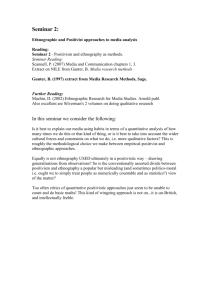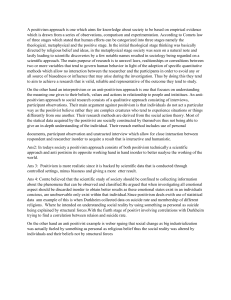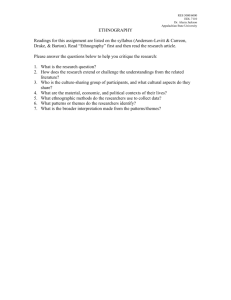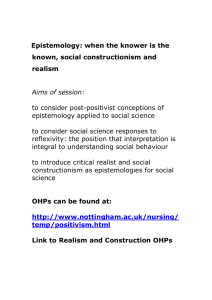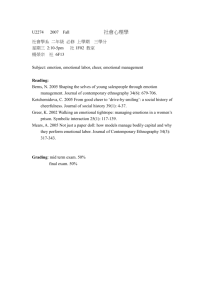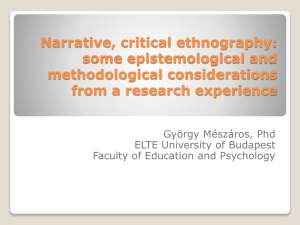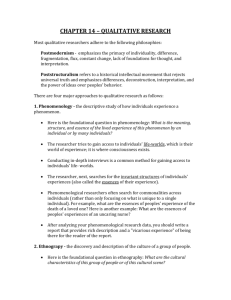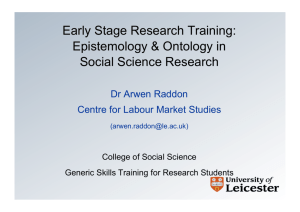A Short Glossary of Terms Useful for Social Research - AAEE
advertisement
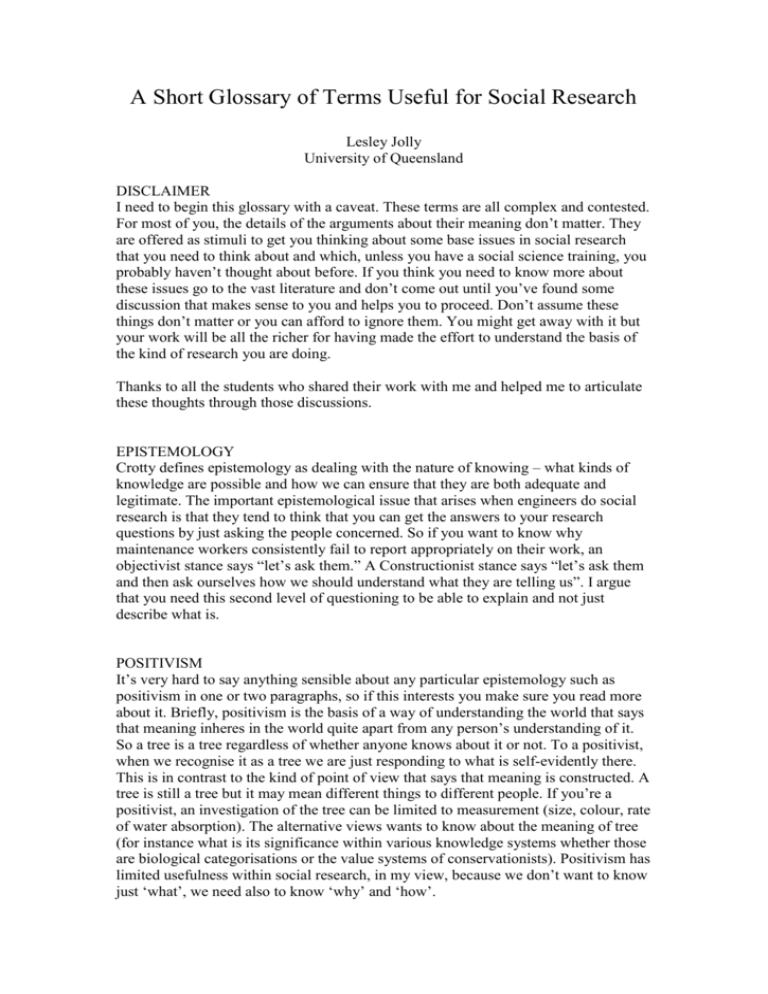
A Short Glossary of Terms Useful for Social Research Lesley Jolly University of Queensland DISCLAIMER I need to begin this glossary with a caveat. These terms are all complex and contested. For most of you, the details of the arguments about their meaning don’t matter. They are offered as stimuli to get you thinking about some base issues in social research that you need to think about and which, unless you have a social science training, you probably haven’t thought about before. If you think you need to know more about these issues go to the vast literature and don’t come out until you’ve found some discussion that makes sense to you and helps you to proceed. Don’t assume these things don’t matter or you can afford to ignore them. You might get away with it but your work will be all the richer for having made the effort to understand the basis of the kind of research you are doing. Thanks to all the students who shared their work with me and helped me to articulate these thoughts through those discussions. EPISTEMOLOGY Crotty defines epistemology as dealing with the nature of knowing – what kinds of knowledge are possible and how we can ensure that they are both adequate and legitimate. The important epistemological issue that arises when engineers do social research is that they tend to think that you can get the answers to your research questions by just asking the people concerned. So if you want to know why maintenance workers consistently fail to report appropriately on their work, an objectivist stance says “let’s ask them.” A Constructionist stance says “let’s ask them and then ask ourselves how we should understand what they are telling us”. I argue that you need this second level of questioning to be able to explain and not just describe what is. POSITIVISM It’s very hard to say anything sensible about any particular epistemology such as positivism in one or two paragraphs, so if this interests you make sure you read more about it. Briefly, positivism is the basis of a way of understanding the world that says that meaning inheres in the world quite apart from any person’s understanding of it. So a tree is a tree regardless of whether anyone knows about it or not. To a positivist, when we recognise it as a tree we are just responding to what is self-evidently there. This is in contrast to the kind of point of view that says that meaning is constructed. A tree is still a tree but it may mean different things to different people. If you’re a positivist, an investigation of the tree can be limited to measurement (size, colour, rate of water absorption). The alternative views wants to know about the meaning of tree (for instance what is its significance within various knowledge systems whether those are biological categorisations or the value systems of conservationists). Positivism has limited usefulness within social research, in my view, because we don’t want to know just ‘what’, we need also to know ‘why’ and ‘how’. THEORY (EXPLANATORY FRAMEWORK) Textbooks like to slap labels on theories because it’s much easier to deal with them that way (symbolic interactionism or the theories of Bourdieu for instance). This is fine if you’re working with quite high level theory that seeks to explain a broad range of phenomena. But you don’t need to go that global. Try starting with your hunches about what might explain the phenomenon you’re looking at. So if you think the thing that makes the difference to maintenance practices is the human factor, you start looking in the literature about human factors at work (I’m borrowing this from Ari). Say you find an article that proposes an explanatory schema: the relevant factors are X, Y and Z and they interact in these and these ways. You can then pick up this schema (theory, explanatory framework) and apply it to your problem. Does it seem to capture everything that is going on and reveal some of why it happens? Or is something missing. Is another component needed or are the relationships different in your case? This is how a helpful theory can guide the development of your research. It defines what you need to look out for in the world and helps refine your questions. Whichever path your work takes, just confirming theory or building on it, your study should conclude with a reconsideration of the framework you have used. How adequate was it? What limitations might be relevant? How should future researchers use it? METHODOLOGY This term is sometimes used interchangeably with methods but this is incorrect. Methods are what you do, the tools you use. Methodology is the logic that dictates what it is you must do and which tools you should choose. So if you’ve got a theory that says those maintenance workers act as they do because of working class resistance to management then you need to see whether there is anything that can be called resistance in their behaviour. So you’re probably going to want to know about aspects of their behaviour that they would normally conceal from bosses. An ethnographic methodology entails some participant observation (working as a maintenance worker or closely alongside them as well as observing what goes on in an organised and principled way) followed up by some kind of procedure that asks the ‘why’ questions – interviews, surveys, structured tests etc. Whatever methodology you choose there should be a logical and stated connection between your potential explanation, the answers you need, and the analysis you will apply. ETHNOGRAPHY This is a word that has very special meaning for anthropologists as it’s the basis of our discipline. Historically it has been understood as the study of a people’s lifeways or culture. So when I undertake ethnography of engineering I am asking what makes it all make sense to you who are inside it – how do you make it work? Now you’re probably thinking “It just does” because culture is transparent to those who swim in it but I need to know about the logic that makes it all tick. I investigate that through a series of questions that seek to expose the underlying logic. Participant observation (PO) is important as a technique because it gives me insight into what engineering means to engineers, so I spend a lot of time hanging with the folks, but I’m also thinking all the time “Why do they do/think/act like that?” and devising ways of exploring whatever has come up using a variety of methods. This makes some engineers I know pretty nervous by the way. Over the last 15-20 years or so ethnography has been colonised by sociologists, management folks and others in ways that look strange to an anthropologist. For a start, some of that research uses only one way of generating data, often interviews, and the resulting studies look a bit thin. Paradoxically another way that some ethnographies fall down is in objectivity. PO demands that the researcher be reflexive about the cycle back and forth from insiders’ views to outsiders’ views framed by theoretical questions. This is sometimes called the hermeneutic cycle or thick description. Without that ability to simultaneously place the researcher in the research and view the research in wider perspective ethnography risks becoming just anecdote. GROUNDED THEORY This is a methodology for exploring participants’ understandings of a phenomenon. For instance, if you want to take account of the fact that maintenance workers have privileged but tacit understandings of the nature of their work you might use this approach. You start by eliciting their account of their work, usually in unstructured interview. You have to make sure there is sufficient opportunity for them to raise issues that you may not have considered but which are significant to them. You then go through all the accounts looking for recurring themes. Deciding what’s a theme and what isn’t is the work of analysis and so it means lots of passes through the text and cross-checking within and between cases (see Richards’ book for details of this). Gradually you will build up a picture of how the workers understand their work and when you are satisfied that no new themes are emerging you can begin to consider what this reveals about their own indigenous theory of maintenance work. It’s grounded theory because it is generated from the ground up. Having said that you can expect to have some work to do relating the grounded theory you come up with to existing discussions of the topic. Remember theory is the explanation – why is it the way it is? This method is associated with Corbin, Strauss and Glaser and there is a large literature for you to consult.
